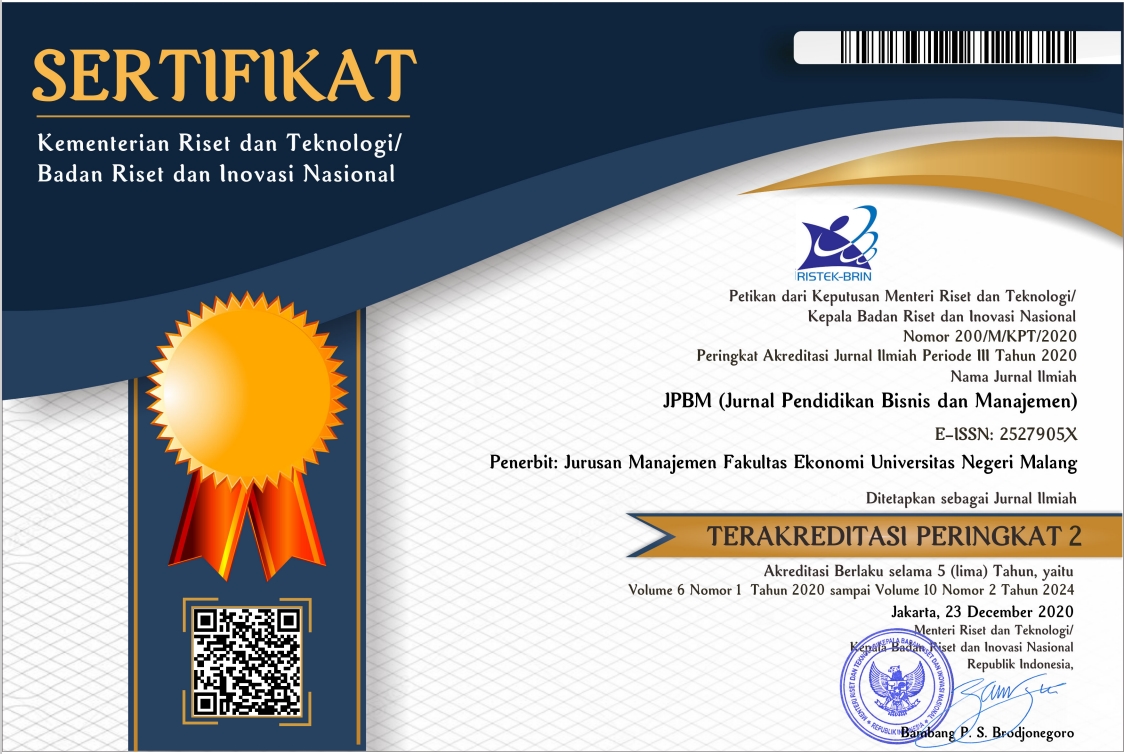Enhancing Lecturer Performance: Investigating the Mediating Role of Organizational Citizenship Behavior
Abstract
This paper investigates the role of organizational citizenship behavior as a mediator in the effect of organizational commitment, leadership style, and organizational culture on lecturer performance and the role of gender as a moderating variable. The number of research samples includes 294 lecturers from private and public universities in East Java, Indonesia. The data were analyzed using structural equation modeling (SEM) with AMOS version 24. The results showed that behavioral variables, including organizational commitment, leadership style, and organizational culture, mediated by organizational citizenship behavior, improved lecturer performance. The results obtained demonstrate that behavioral variables have a significant influence on lecturer performance. The results of this study also show that gender as a moderation variable is empirically proven to increase the influence of behavioral variables on lecturer performance. Our study proposes that behavioral variables are key components that contribute to lecturer performance in pursuing their passion and enhancing their performance.
Keywords: Leadership Style, Lecturer Performance, Organizational Commitment, Organizational Culture
Full Text:
PDFReferences
Alimo-Metcalfe, B. (1995). An investigation of female and male constructs of leadership andempowerment. Women in Management Review, 10(2), 3-8.
Alsheikh, G., & Sobihah, M. A. A. (2019). Effect of behavioral variables on organizational citizenship behavior (OCB), with job satisfaction as moderating among Jordanian five-star hotels: A pilot study. International Journal of Ethics and Systems, 35(2), 272-283.
Angriani, M. R., Eliyana, A., Fitrah, H., & Sembodo, P. (2020). The Effect of Transactional and Transformational Leadership on Lecturer Performance with Job Satisfaction as the Mediation. Systematic Reviews in Pharmacy, 11(11), 21-32.
Ardiansyah, T., & Endryboeriswati, U. S. (2022). Organizational commitment in private universities requires transformational leadership reform to increase lecturer performance. Journal of Positive School Psychology, 5, 2427-2446.
Avolio, B. J., & Bass, B. M. (2004). Multifactor leadership questionnaire (MLQ). In J. Antonakis, A. T. Cianciolo, & R. J. Sternberg (Eds.), The nature of leadership (pp. 329-342). Sage Publications.
Badawy, T. A., Kamel, M. M., & Magdy, M. M. (2016). Exploring the Relationship between organizational culture, job satisfaction, and organizational citizenship behaviour. International Journal of Human Resource Studies, 6(4), 20.
Bolotio, R., Ardianto, & Kaharuddin, N. N. (2021). The Influence of organizational citizenship behavior and organizational commitment towards teachers’ performance Madrasah Aliyah in Bitung. 11th Annual International Conference on Industrial Engineering and Operations Management.
Chen, W. J. (2016). The model of service-oriented organizational citizenship behavior among international tourist hotels. Journal of Hospitality and Tourism Management, 29, 24-32.
Chapman, D. S., Reeves, P., & Chapin, M. (2018). A lexical approach to identifying dimensions of organizational culture. Frontiers in Psychology, 9, 876.
Cooper, L., Cartwright, S., & Earley, C. (2001). The international handbook of organizational culture and climate (1st ed.). New Jersey: Hoboken, NJ: Wiley.
Dastane, D. O. (2020). Impact of leadership styles on employee performance: A moderating role of gender. Australian Journal of Business and Management Research, 5(12), 27-52.
De Vaus, D., & McAllister, I. (1991). Gender and work orientation: Values and satisfaction in Western Europe. Work and Occupations, 18(1), 72-93.
Diekman, A. B., & Eagly, A. H. (2000). Stereotypes as dynamic constructs: Women and men of the past, present, and future. Personality and Social Psychology Bulletin, 26(10), 1171-1188.
Fellows, R., & Liu, A. M. (2013). Use and misuse of the concept of culture. Construction Management and Economics, 31(5), 401-422.
Fitriana, A. D., Mutmainnah, I., & Halifah, S. (2021). Penyelenggaraan Tridharma perguruan tinggi sesuai Bidang Keilmuan sebagai upaya Personal Branding Dosen. Komunida: Media Komunikasi dan Dakwah, 11(02), 195-215.
Fry, L. W. (2003). Toward a theory of spiritual leadership. The Leadership Quarterly, 14(6), 693-727.
Gianie. (2021, Juni 16). Merosotnya peringkat perguruan tinggi Indonesia. Retrieved from Kompas. id
Giberson, T. R., Dickson, M. W., Mitchelson, J. K., Randall, K. R., & Clark, M. A. (2009). Leadership and organizational culture: Linking CEO characteristics to cultural values. Journal of Business Psychology, 24, 123-137.
Grego-Planer, D. (2019). The relationship between organizational commitment and organizational citizenship behaviors in the public and private sectors. Sustainability, 11, 6395.
Haziroh, A. L. (2021). The effect of leadership style and IT support on lecturer performance during e-learning program with work environment as mediating variable. Asian Management and Business Review, 1(2), 116-127.
Indarti, S., Solimun, Fernandes, A. A., & Hakim, W. (2017). The effect of OCB in relationship between personality, organizational commitment and job satisfaction on performance. Journal of Management Development, 36(10), 1283-1293.
Irvania, S., & Claudia, M. (2022). The effect of organizational commitment and quality of work life on. Organizational citizenship behavior during pandemic in wastewater management company PD PAL Banjarmasin, 10(2), 15 - 24.
Jaya, R. (2016). Budaya oganisasi, komitmen organisasi dan organizational citizenship behavior (OCB). Jurnal Ilmu Administrasi Negara, 13, 407-414.
Judge, T. A., & Piccolo, R. F. (2004). Transformational and transactional leadership: A meta-analytic test of their relative validity. Journal of Applied Psychology, 89(5), 755.
Kalleberg, A. L., & Griffin, L. J. (1978). Positional sources of inequality in job satisfaction. Sociology of Work and Occupations, 5(4), 371-401.
Kartini, I. (2017). Pengaruh gaya kepemimpinan terhadap organizational citizenship behaviour (OCB) di Politeknik LP3I Jakarta Kampus Jakarta Utara. Jurnal Lentera Bisnis, 6(1), 75-84.
Kjellström, S., Stålne, K., & Törnblom, O. (2020). Six ways of understanding leadership development: An exploration of increasing complexity. Leadership, 16(4), 434-460.
Kochan, F. K., Spencer, W. A., & Mathews, J. G. (2000). Gender-based perceptions of the challenges, changes, and essential skills of the principalship. Journal of School Leadership, 10(4), 290-310.
Kurniawan, R. A., Qomariah, N., & Winahyu, P. (2019). Dampak organizationlal citizenship behavior, motivasi kerja, dan kepuasan kerja terhadap kinerja karyawan. Jurnal Penelitian IPTEKS, 4(2), 148-160.
Lian, L. K., & Tui, L. G. (2012). The mediating effect of downward influence tactics on the relationship between leadership style and organizational citizenship behavior. Jurnal Pengurusan, 36(2), 3-16.
Lidinnillah, F., Murni, S., & Madhakomala, R. (2019). The effect of reward on organizational citizenship behavior (OCB) lectuurers Of Muria Kudus University (UMK) Kudus Central Java. Prosiding, 5, 291-295.
Manurung, E. F. (2020). The Effects of Transformational leadership, competence and compensation on work motivation and implications on the performance of lecturers of maritime college in DKI Jakarta. International Journal of Multicultural and Multireligious Understanding, 7(6), 112-126.
Meyer, J. P., & Allen, N. J. (1991). A three-component conceptualization of organizational commitment. Human Resource Management Review, 1(1), 61-89.
Mohammad, J., Quoquab Habib, F., & Zakaria, S. (2010). Organizational citizenship behavior and commitment: do age and tenure make any difference?. Business Management Quarterly Review, 1(3), 28-49.
Nadatien, I., Handoyo, S., Pudjirahardjo, W. J., & Probowati, Y. (2020). The influence of OCB (organizational citizenship behavior) on the lecturer's organizational pride (a study at university of Nahdlatul Ulama Surabaya). Kresna Social Science and Humanities Research, 1, 1-5.
Nadeak, B. (2020). Deskripsi kinerja dosen perguruan tinggi swasta di Indonesia. Bandung: Widina Bhakti Persada.
Nielsen, T. M., Hrivnak, G. A., & Shaw, M. (2009). Organizational citizenship behavior and performance: A meta-analysis of group-level research. Small Group Research, 40(5), 555-577.
Novianti, K. R. (2021). Does organizational commitment matter? Linking transformational leadership with organizational citizenship behavior (OCB). Jurnal Aplikasi Manajemen, 19(2), 335-345.
Purwanto, A. (2020). Effect of organizational citizenship behavior, work satisfaction and organizational commitment toward indonesian school performance. Sys Rev Pharm, 11(9), 962-971.
Nulhaqim, S. A., Heryadi, D. H., Pancasilawan, R., & Ferdryansyah, M. (2016). Peranan perguruan tinggi dalam meningkatkan kualitas pendidikan di Indonesia untuk menghadapi Asean community 2015 studi kasus: Universitas Indonesia, Universitas Padjadjaran, Institut Teknologi Bandung. Share: Social Work Journal, 6(2), 197.
Nurhasanah, N. (2022). Systematic literature review: Measurement model of lecturer performance and organizational citizenship behaviours based on work environment characteristics, innovation and knowledge sharing. Central Asia & the Caucasus, 23(1), 14046091
Özdem, G. (2012). The relationship between the organizational citizenship behaviors and the organizational and professional commitments of secondary school teachers. Journal of Global Strategic Management, 2(6):47-47.
Permanasari, R., Setyaningrum, R. M., & Sundari, S. (2014). Model hubungan kompetensi, profesionalisme dan kinerja dosen. JBMP (Jurnal Bisnis, Manajemen dan Perbankan), 1(2), 157-174.
Purwanto, A., Wijayanti, L. M., Hyun, C. C., & Asbari, M. (2019). The effect of tranformational, transactional, authentic and authorian leadership style toward lecture performance or private university in Tangerang. Dinasti International Journal of Digital Business Management (DIJDBM), 1(1), 21-33.
Sadya, S. (2023, April 10). Indonesia Miliki 316.912 Dosen pada 2022. Retrieved from https://dataindonesia.id
Saputra, A. I. (2023). Analysis of the effect of leadership style towards employee performance with job satisfaction as mediator and gender as moderator. Indonesian Interdisciplinary Journal of Sharia Economics (IIJSE), 6(1), 313-333.
Satata, S., Trisnamansyah, S., Sujiarto, H., & Kosasih, U. (2022). The effect of leadership, organizational culture, commitment, and teacher competency on teacher performance. International Journal of Educational Research and Social Sciences (IJERSC), 3(4), 1673-1681.
Setyorini, T., Manafe, J. D., & Nino, I. J. (2022). The role of organizational commitment and organization culture toward job performance. Jurnal Riset dan Aplikasi: Akuntansi dan Manajemen, 5(3), 389-396.
Sewang, A. (2022). The influence of leadership style, organizational culture, and motivation on the job satisfaction and lecturer’s performance at College of Darud Dakwah Wal Irsyad (DDI) at West Sulawesi. International Journal of Management and Administrative Sciences (IJMAS), 3(5), 08-22).
Shahzad, F., Luqman, R. A., Khan, A. R., & Shabbir, L. (2012). Impact of organizational culture on organizational performance: An overview. Interdisciplinary Journal of Contemporary Research in Business, 3(9), 1-13.
Siswadi, Y., Jufrizen, Farisi, S., & Sari, M. (2023). Organizational culture and organizational citizenship behavior: The mediating role of learning organizations and organizational commitment. Jurnal Riset Bisnis dan Manajemen, 16(1), 73-82.
Spreitzer, G. M. (1995). Psychological empowerment in the workplace: Dimensions, measurement, and validation. Academy of management Journal, 38(5), 1442-1465.
Sriekaningsih, A., & Setyadi, D. (2015). The effect of competence and motivation and cultural organization towards organizational commitment and performance on state university lecturers in East Kalimantan Indonesia. European Journal of Business and Management, 7(17), 208-220.
Suparno, S., & Asmawati, L. (2019). Monitoring dan evaluasi untuk peningkatan layanan akademik dan kinerja dosen program studi teknologi pembelajaran pascasarjana. JTPPm (Jurnal Teknologi Pendidikan dan Pembelajaran): Edutech and Intructional Research Journal, 6(1), 11-23.
Randall, L. M., & Coakley, L. A. (2007). Applying adaptive leadership to successful change initiatives in academia. Leadership & Organization Development Journal, 28(4), 325-335.
Ullah, I., Wisetsri, W., Wu, H., Shah, S. M., Abbas, A., & Manzoor, S. (2021). Leadership styles and organizational citizenship behavior for the environment: The mediating role of self-efficacy and psychological ownership. Frontiers in Psychology, 12, 683101.
Wartulas, S., Sugiyo, Sudana, I. M., & Suminar, T. (2022). The effect organizational culture, organizational commitment and achievement motivation on performance of lecturers at the ex-Pekalongan residence. International Conference on Science, Education and Technology, 1320-1325.
Whittington, L., Coker, R., Goodwin, V., Ickes, W., & Murray, B. (2009). Transactional leadership revisited: self–other agreement and its consequences. Journal of Applied Social Psychology, 39(8)1860-1886.
Widayanto, T., & Nugroho, S. H. (2022). The influence of leadership, organizational culture, and work competence on employee performance through work motivation. Jurnal Pamator, 15(2), 81-97.
Williams, L. J., & Anderson, S. E. (1991). Job satisfaction and organizational commitment as predictors of organizational citizenship and in-role behaviors. Journal of Management, 17, 601-617.
Winarsih, S., & Riyanto, S. (2020). The effect of organizational culture, organizational justice, and organizational commitment on organizational citizenship behavior (OCB). International Journal of Management and Humanities (IJMH), 5(1), 12-19
Yanti, D. A. (2018). Pengaruh kepemimpinan transformasional dan learning organization terhadap kinerja perguruan tinggi swasta di Surabaya. Jurnal Aplikasi Pelayaran dan Kepelabuhanan, 9(1), 84-103.
Refbacks
- There are currently no refbacks.
JPBM (Jurnal Pendidikan dan Bisnis Manajemen) is licensed under a Creative Commons Attribution-NonCommercial-ShareAlike 4.0 International License.
JPBM (Jurnal Pendidikan dan Bisnis Manajemen) is abstracted and indexed in :
















